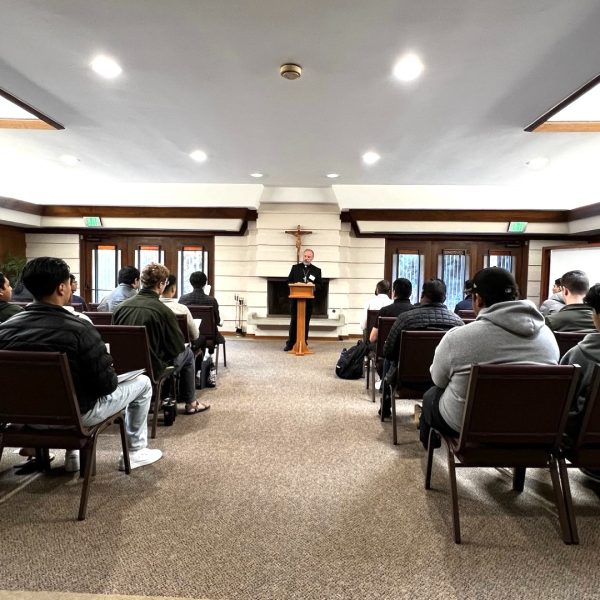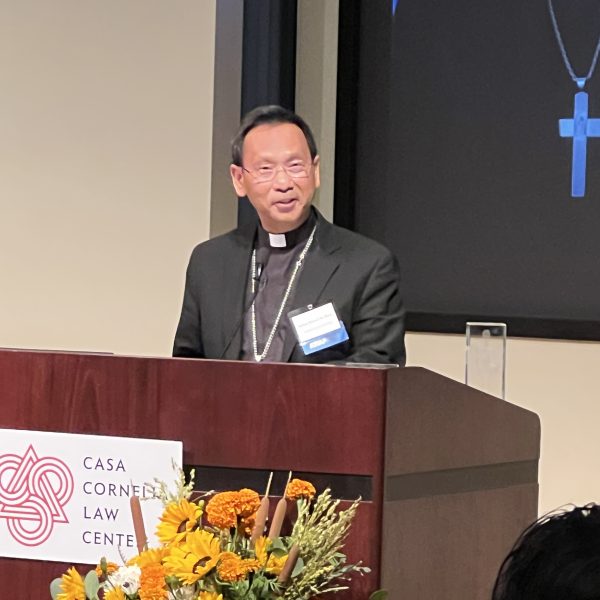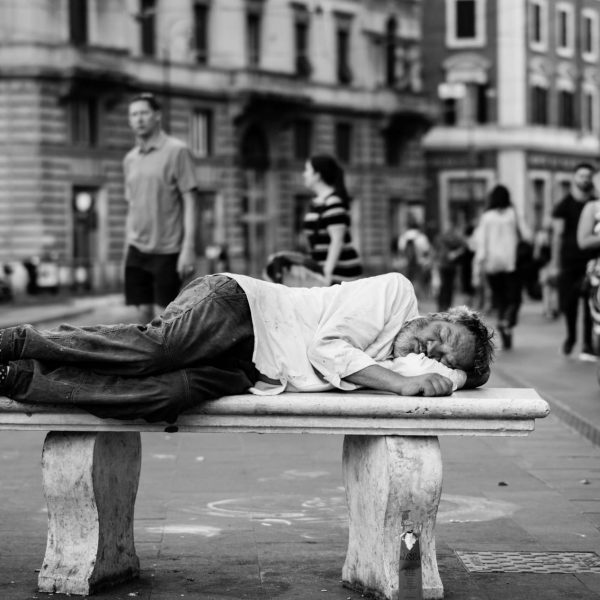Father Ed McKenzie, OFM, leads retreats for military veterans and their families at Mission San Luis Rey in Oceanside.
The next Coming Home Veteran’s Retreat will be held from 9 a.m. to 5 p.m., on Saturday, Aug. 9. An optional closing Mass will follow the retreat.
Born and raised in Jackson, Michigan, 76-year-old “Father Ed” is a U.S. Air Force veteran who served during the Vietnam War. He suffers from post-traumatic stress disorder (PTSD), as well as the effects of exposure to the defoliant known as Agent Orange.
A late vocation, Father Ed was a husband and father before entering the Franciscan Order in 2003 and being ordained to the priesthood on May 5, 2011. He came to San Diego about a year ago, after about 12 years of ministry in Chicago.
Question: What role did the Catholic faith play in your formative years?
Answer: My whole family was baptized into the Catholic Church when I was about 9. My dad and mom brought us up in the faith, and it stayed with me.
When did you feel the first stirrings of a priestly vocation?
Around the time our family converted, I started thinking about what I wanted to do for a living, and the world of the Catholic Church opened up to me. I saw what was going on at the altar, that priest up there with the fancy clothes, and I thought that might be a nice job.
I explored the idea of being a priest and was intrigued by St. Francis of Assisi, after learning about him from a Secular Franciscan in our neighborhood.
In 1963, I entered St. Joseph’s Minor Seminary, which was run by the Franciscans, in Oak Brook, Illinois. It went well for four years, before I decided that priesthood wasn’t for me; I liked girls too much. I left and got drafted promptly.
Did anything else influence your decision to leave the seminary?
The world was a mess, and I was confused.
Vietnam was happening. All the Kennedys were getting killed. I had entered the seminary before Vatican II and, in the middle of my studies, the council happened. Because of all the changes, I felt at that time that the priest I had wanted to be when I entered the seminary was no longer the priest I could be after Vatican II. Although in hindsight, it was the best thing that could have happened to our Church, it was a confusing time for a young mind.
How did your military service begin?
I was drafted in 1968, but I decided I didn’t want to sleep in foxholes, so I went down to the Air Force recruiter with my draft notice and said, “Can you get me in?” The next thing you know, I’m in the Air Force, where I worked on helicopters.
My first military assignment was with NASA. I was assigned to Apollo 11. We flew cover for the astronauts at Johnson Space Center in Houston. When Neil Armstrong crashed the lunar landing training module, we rescued him, put out the fire and took him to the hospital.
Once Apollo 11 made it to the moon, they sent me to Vietnam, and it went downhill after that.
What was it like in Vietnam?
It was a hellish place. I’m still struggling with PTSD and taking medicine for the bad dreams.
In Vietnam, I was in air rescue. We deployed special forces in the jungle, and then we would extract them after the battle in our helicopters. I didn’t have to shoot anybody, which I’m grateful for, but a lot of my buddies did.
Did you pursue a religious vocation immediately after the war?
No, I got married in 1972, after getting out of the service. It wasn’t a marriage made in heaven. We got married for the wrong reasons, and we were like oil and water, but we ended up with two wonderful boys. My wife and I divorced in 1989, and our marriage was annulled. Today, we are not “friends,” particularly, but can be “friendly” to each other.
Combat veterans can be difficult to live with, and the baggage that I brought back from the war played a big role in the failure of my marriage. I decided that I was no good at marriage, so I stayed single.
Feeling that I needed meaning in my life, I got involved at my parish. I served as a lector and an extraordinary minister of Holy Communion. One thing led to another, and I started taking theology courses and even thought about the permanent diaconate. Then, a Franciscan high school classmate of mine suggested that I come back to the Franciscans; at age 55, I did.
How did you get involved with veterans ministry?
While ministering in Chicago, I saw that the Bellarmine Jesuit Retreat House had a “Coming Home Retreat” for veterans. I attended it myself, and it was the best thing I ever did. It was an opportunity for me to talk to other veterans, who understood where I was coming from.
I ended up joining the retreat team, helping Jesuit Father Michael Sparough, who had developed the retreat based on the Spiritual Exercises of St. Ignatius of Loyola. I was on the team for 10 years, and we gave three retreats a year. A year ago, I felt that I should take this retreat somewhere else in the country. After researching possible locations, Mission San Luis Rey, with Camp Pendleton so close by, grabbed my attention.
What impact did your war experience have on your retreat ministry?
Vietnam changed my perception of St. Francis of Assisi. Previously, I thought of him as that smiling garden statue with a bird on his shoulder. I came back from Vietnam with a much different vision: a man who was broken and hurt by PTSD, just like me.
Francis was a knight. He experienced combat and was shattered by it. I saw him as proof that a broken soldier can become a saint. That’s my message in my talks to veterans: You can become a saint; you don’t have to wallow in your misery; you can rise above that, just like Francis did.
Why is ministry to veterans so important?
The suicide rate for veterans is terrible. It’s an epidemic. I’m doing my small bit to try to address that, paying it forward for the healing that I’ve received. I feel most like a priest when trying to help veterans.
What advice would you give to those who are seeking to discern God’s call?
First, get a good spiritual director. You need good advice. You’ve got to listen to the urgings of the Spirit, and the Spirit usually works through other people.
It’s important to understand that we have free will. I could have been anything I wanted to be in life, and God wouldn’t have interfered. But when God created me, he knew what would be best for me, and it was my job to discover that, to seek it out and live it. It took me a while.
When you finally say yes to his will for you, he gives you graces that you can’t imagine ever being possible. When you finally align your will to his will, it’s a much smoother road.
Are there any devotions that you would recommend for those who want to grow closer to God?
Personally, I love the rosary and the Liturgy of the Hours. Everybody has a way that’s going to fit their personality; whatever that is, do it.
But find a spirituality that will take you out of yourself, a spirituality that will flow into other people in some way. We’re in this life together, and we have got to help each other out.
For example, for me, the rosary is not a personal devotion; it’s a connection to other people. On each bead, I think of an individual. Whoever comes into my mind, that’s who I pray for. When I’m done saying my daily rosary, I’ve spent time with a lot of people in my mind.
The Coming Home Veteran’s Retreat will be held on Saturday, Aug. 9, at Mission San Luis Rey. Learn more at sanluisrey.org/retreats.









